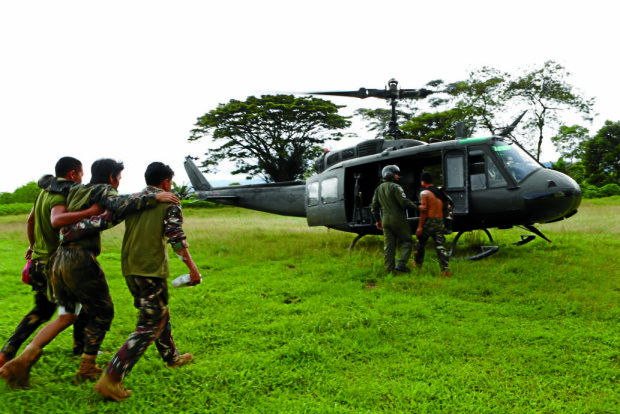Lawmaker sees massive responsibility of AFP

Soldiers assist their comrade wounded during the ground and air assault Wednesday against members of ISIS-inspired militant group in the southern Philippine city of Marawi. PHOTO BY JEOFFREY MAITEM / INQUIRER MINDANAO
President Rodrigo Duterte’s declaration of martial law in Mindanao to deal with a terrorist threat has given the military a massive responsibility to preserve democracy in the country and ensure that people’s rights are upheld.
“The Armed Forces of the Philippines has been the only guarantee of the country and the people against an unjustified declaration of martial law, or worse a revolutionary government,” said security analyst Ashley Acedillo, a former Air Force pilot who took part in the Oakwood mutiny in 2003.
“In fact, the AFP enjoys broad trust and support from the people. How they will proceed from hereon will be crucial to our democracy,” Acedillo said.
The administration-allied militant Makabayan bloc in the House of Representatives opposes Mr. Duterte’s declaration primarily because it believes this will pave the way for military abuse.
Martial law implementer
Article continues after this advertisementThe bloc alleges that Armed Forces chief of staff Gen. Eduardo Año, Mr. Duterte’s appointed martial law implementer, has a tainted human rights record, especially with his supposed involvement in the abduction of activist Jonas Burgos, son of democracy icon Jose Burgos Jr.
Article continues after this advertisementAño has denied any involvement in the Burgos case and has built a reputation in the military as a respected commander.
Año has played crucial intelligence and operational roles in military operations against the communist insurgency.
Bound by accountability
Security analyst Chester Cabalza said the necessity to declare martial law should not be abused.
Cabalza said the intent of Mr. Duterte was to “stabilize a high-risk security threat to defeat militant or terrorist groups, [but] the declaration of martial law should still be bounded by legal instruments and the President’s accountability.”
Acedillo, a former Magdalo representative, urged the people not to allow their “fear to take over and surrender vigilance to the false sense of security that a martial law declaration brings.”
“Once we do so, we may soon realize that the cure is worse than the disease. By the time we found out that something is amiss, it is already too late. We cannot afford to be wrong again,” he said.
Acedillo described the martial law declaration as “very controversial” because Mr. Duterte “is not particularly known for his democratic tendencies, but rather for his populist, quick-fix, strongman approaches.”